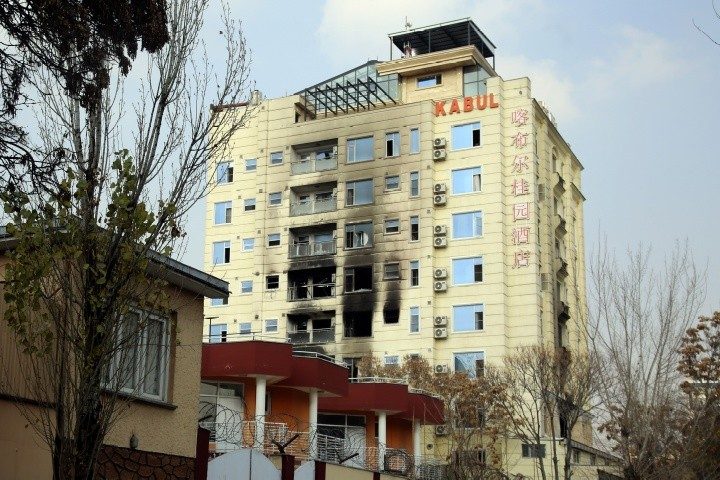
An Islamic State in Iraq and Syria (ISIS) branch claimed responsibility for an attack on Monday at a Kabul hotel popular among Chinese businessmen and diplomats.
This attack was the first one targeting citizens from one of the few countries with warm relations with the Taliban since the latter assumed power in 2021.
Two armed members of the Islamic State-Khorasan (IS-K), a local branch of the militant group based in the Middle East, set off explosive devices inside the Kabul Longan Hotel in a luxurious district of the Afghan capital. The attack only ceased when security forces killed at least three of the gunmen.
The organization asserted that the suicide attack killed or wounded at least 30 people, based on reports from the Site Intelligence Group.This is IS-K’s third attack in the last few months, attacking targets linked to nations that have cozy relations with the Taliban.
A spokesman for Afghanistan’s Taliban-led government, Zabihullah Mujahed, reported that two foreign nationals sustained injuries while jumping from the hotel balcony and three assailants were killed after government forces participated in a gun duel with them.
Chinese Foreign Ministry spokesman Wang Wenbin announced in a regular briefing on Tuesday that five Chinese citizens were injured, and that Chinese diplomats in Afghanistan sought serious discussions with the government following the attack.
Kabul’s Emergency Hospital, operated by an Italian non-profit, reported receiving 21 casualties — 18 injured and three dead on arrival.
The assault occurred at the Kabul Longan Hotel in Shahr-e-Naw, a commercial and residential district in the Afghan capital. A video posted on Twitter by a journalist in Kabul depicted smoke rising from a multi-story building, with one lower floor ablaze.
Residents of the area said the hotel was where Chinese and other foreigners typically stay. They claim they heard a powerful explosion before the shooting.
A video on social media depicted people climbing out of windows on the lower floors of the building, with the hotel sign — in English and Chinese — in full view.
Other videos showcased huge flames with thick clouds of smoke billowing out of another section.
In September, ISIS claimed credit for an attack just outside the Russian embassy. The attack killed several people, including a senior diplomat and a security guard.
ISIS is one of the Taliban’s most formidable security threats as it conducts massive attacks in highly populated areas. Even before the Taliban seized control, the militant group was fighting it in order to enforce its even-stricter Islamic ideology and widen its clout in the region.
Previously, ISIS also took responsibility for an attack on Pakistan’s embassy in Kabul, based on a statement made by one of ISIS’ affiliated channels on Telegram.
Gunfire wounded a Pakistani security guard, officials reported, in what Islamabad termed as an attempt to assassinate its head of mission, who emerged unscathed. Pakistani Prime Minister Shehbaz Sharif called for an investigation and action against the perpetrators.
Pakistan’s foreign office also announced that the Afghan charge d’affaires in Islamabad had been summoned over the “extremely serious lapse in security” and that he told them security had been “beefed up” at Pakistan’s mission.
ISIS said the attack was perpetrated by two of its members who were loaded with “medium and sniper weapons.” The attackers were targeting the ambassador as well as his guards who were present at the courtyard of the embassy. The attack injured at least one guard and caused damage to the building, the group said.
A spokesman for the Taliban foreign ministry condemned the attack. “[The] Islamic Emirate of Afghanistan strongly condemns the attempted shooting and failed attack on the Pakistani embassy in Kabul,” spokesman Abdul Qahar Balkhi said on Twitter, elaborating that Taliban security agencies would investigate.
The attack happened amid increased security concerns in areas abutting Afghanistan after the Pakistani Taliban (TTP) said it would no longer adhere to a months-long ceasefire with the Pakistani government.
Since late 2021, the Afghan Taliban have been facilitating peace talks between local militants and Pakistani authorities. Yet the spate of recent attacks showcases the challenges the Taliban faces to overcome its international isolation and attract foreign investments to Afghanistan’s largely untapped mineral resources.
The Taliban has restricted diplomatic links with only seven countries, including Russia and China. However, even those countries have not formally acknowledged its legitimacy.
Based on U.S. military reports, the former leader of ISIS was killed in an operation carried out by the rebel Free Syrian Army in mid-October in Syria’s Daraa province.
A spokesman for ISIS, in an audio message posted on a related Telegram channel, announced that Abu al-Hassan al-Hashemi al-Quraishi, a nom de guerre, was slain while “fighting enemies of God,” without elaborating. His death strikes another heavy blow to a group that hitherto unleashed terror across the Middle East.
Subsequently, ISIS chose Abu al-Hussein al-Husseini al-Quraishi — also an alias — as its new leader.
“Quraishi” alludes to a tribe of the Prophet Muhammad, from whom ISIS leaders claim descent.
No details about the new ISIS leader were provided in the audio.
Hassan Hassan, author of a book on ISIS, said one “unprecedented” but possible scenario was that Hashemi “was killed ‘accidentally’ during a raid or fighting without him being known to whoever killed him.”
But “jihadist groups have a long history of claiming leaders/commanders dead, just to get intelligence/security agencies off their backs,” he elaborated on Twitter.
Yet, Hassan said ISIS has been weakened.
“This doesn’t mean the group is finished, but for now it is a shadow of its former self. They are hollowed out in terms of their leadership and their ability to carry out attacks,” he said. “They don’t have iconic, charismatic leaders any more, and they haven’t carried out any major attacks recently.”
ISIS emerged from the turmoil of the civil war in Iraq and conquered huge areas of Iraq and Syria in 2014.
Former ISIS caliph Abu Bakr al-Baghdadi declared an Islamic caliphate from a mosque in the northern Iraqi city of Mosul that year and declared himself caliph of all Muslims.
ISIS’ tyrannical rule, during which it killed and executed thousands of people in the name of its narrow interpretation of Islam, finally ceased in Mosul, when Iraqi and international forces defeated the group there in 2017.
Since the zenith of its power seven years ago, when it ruled millions of people in the Middle East and shocked the world with brutal bombings and shootings, ISIS has begun to fade into the background.
Its remaining thousands of militants have mostly sought refuge in rural hinterlands of fractured Iraq and Syria, though they are still capable of carrying out significant belligerent attacks.



